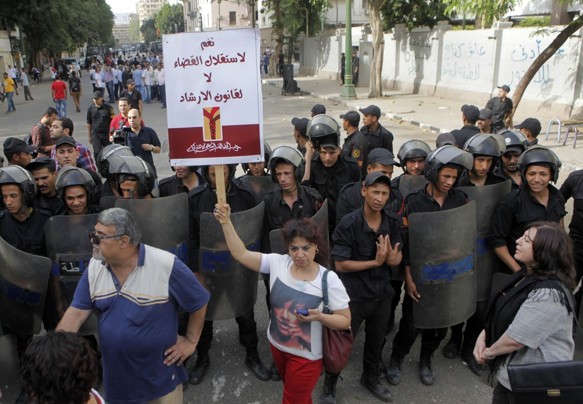 CAIRO — Egypt’s Supreme Constitutional Court ruled on Saturday against parts of an election law approved by the Islamist-led legislature that had lifted a long-standing ban on the use of religious slogans during campaigning.
CAIRO — Egypt’s Supreme Constitutional Court ruled on Saturday against parts of an election law approved by the Islamist-led legislature that had lifted a long-standing ban on the use of religious slogans during campaigning.
The decision is the latest sign of tensions between the judiciary and President Mohammed Morsi and his Islamist allies. The courts have dealt Islamists several setbacks over the past two years, including the dissolution of parliament’s lower house last year. That ruling was also issued by the Supreme Constitutional Court, which had judged the law governing its election invalid.
In its decision on Saturday, the court said that not explicitly banning religious slogans in campaigns runs counter to national unity and principles of citizenship. It said religious slogans may distract voters from focusing on the candidate’s platform.
The bill will be sent back to the Shura Council, or upper house of parliament, for review. The council has temporarily assumed legislative powers in the absence of a lower house of parliament.
It was the second rebuff for the interim parliament’s electoral law. The first came in March when a court ruled that the Shura Council had improperly passed the law without allowing the country’s Supreme Constitutional Court to review it to ensure it conforms with the constitution. That decision annulled Morsi’s decree to begin elections in April.
The Supreme Constitutional Court similarly ruled Saturday against a provision of the law that requires media outlets to give equal time to candidates, saying this violates freedom of the press.
The court also said the bill breaches the principles of separation of powers because it allows the president to set election dates and change them. Morsi had said recently elections could be held in October.
The back and forth over the law is the latest example of the power tussle between the judiciary and Morsi and his allies.
Another row is centered on a controversial law that would drop retirement age for judges from 70 to 60. This would affect nearly a quarter of the country’s 13,000 judges and prosecution officials, most of them in senior positions, including in Egypt’s Supreme Constitutional Court.
Muslim Brotherhood lawmakers backed by other Islamists in the Shura Council pushed ahead with plans to debate the judicial reform law Saturday.
The move by the president’s party and others prompted the country’s top council of judges to suspend participation in a government-backed conference earlier this month. Morsi had sponsored the conference, which was meant to allow judges the chance to draft proposals on how reform the judiciary.
Morsi’s allies say Egypt’s judiciary is filled with supporters of ousted president Hosni Mubarak, who have worked to undermine the transition to democracy and the Islamists’ rise to power.
Many judges agree in principle on the need for reform, but don’t want the presidency or the legislature to carry it out. They say Morsi has tried to interfere in their affairs and curb their independence.
On Saturday, opposition lawmakers wore black sashes during the Shura Council session that read: “Illegitimate procedure. Illegitimate law.”
The handful of opposition members in the Shura Council shouted “illegitimate” as the speaker of the interim parliament, Ahmed Fahmy, said the law will be debated in principle by the body’s Legislative Committee. Fahmy is also a Brotherhood party member.
Dozens of protesters outside the building were led by opposition figure Hamdeen Sabahi, who placed third in the country’s nationwide presidential elections last year. They accused the Shura Council itself of being illegitimate, recalling the fact that only 7 percent of the electorate voted for the body, which traditionally does not legislate. Morsi appoints a third of the council’s members.
“This law is a clear attack on the judiciary and it’s against the constitution,” Sabahi told The Associated Press. “There’s no one logical or wise reason in the nation’s interest to insist on passing this law with such hastiness or even discussing it in the Shura Council.”
Copyright 2013 The Associated Press. All rights reserved. This material may not be published, broadcast, rewritten or redistributed.



